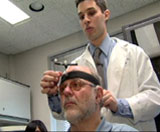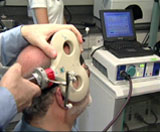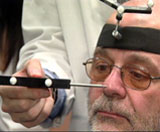Magnetic Stimulation for Stroke
 BOSTON (Ivanhoe Broadcast News) -- Every 53 seconds, someone in the United States has a stroke. Doctors say after six months a patient's recovery progress plateaus, often leaving them unable to do everyday activities. Now, a new treatment may change that. BOSTON (Ivanhoe Broadcast News) -- Every 53 seconds, someone in the United States has a stroke. Doctors say after six months a patient's recovery progress plateaus, often leaving them unable to do everyday activities. Now, a new treatment may change that.
Since childhood Bob Massarino has cherished his train collection. But this simple boyhood pleasure was derailed when, at age 47, Massarino had a stroke. His last words? “Hey, hey how ya doing and then fell, gone ... gone.”
He didn't speak again for 10 years. The stroke affected the left side of Massarino's brain, robbing him of the use of his right arm, leg and speech. But an experimental technology called repetitive transcranial magnetic stimulation, or rTMS, gave him hope.
 "When a person has a stroke, he loses a part of his brain, and this will cause a decrease in the brain's activity," says neurologist Felipe Fregni, M.D., Ph.D., of Beth Israel Deaconess Medical Center in Boston. "When a person has a stroke, he loses a part of his brain, and this will cause a decrease in the brain's activity," says neurologist Felipe Fregni, M.D., Ph.D., of Beth Israel Deaconess Medical Center in Boston.
That decreased activity signals the healthy side of the brain to go into overdrive. Researchers now believe that actually hinders the stroke side from healing.
Once the computer registers Massarino's facial features, this coil sends an electrical current to the healthy side of the brain, balancing out both hemispheres. The treatments are relatively pain-free, but Dr. Fregni from Harvard Medical School says some patients have reported mild headaches.
 Massarino has been through 10 sessions in the past two years and has noticed improvement. He says magnetic stimulation now allows him to count out loud, a simple task he simply couldn't do before. Massarino has been through 10 sessions in the past two years and has noticed improvement. He says magnetic stimulation now allows him to count out loud, a simple task he simply couldn't do before.
Researchers say the magnetic stimulation works better on smaller lesions. Patients will usually see more results the more often they go for the treatment. Dr. Fregni says one important side effect to note with brain stimulation, there is a risk of seizures.
This article was reported by Ivanhoe.com, who offers Medical Alerts by e-mail every day of the week. To subscribe, go to: http://www.ivanhoe.com/newsalert/ .
If you would like more information, please contact:
Kathleen Cosgrove
Media Relations
Beth Israel Deaconess Medical Center
330 Brookline Ave., GZ-604
Boston, MA 02215
(617) 667-7305
kcosgrov@bidmc.harvard.edu
http://www.bidmc.harvard.edu
Related Articles in Latest Medical News:
|
|
